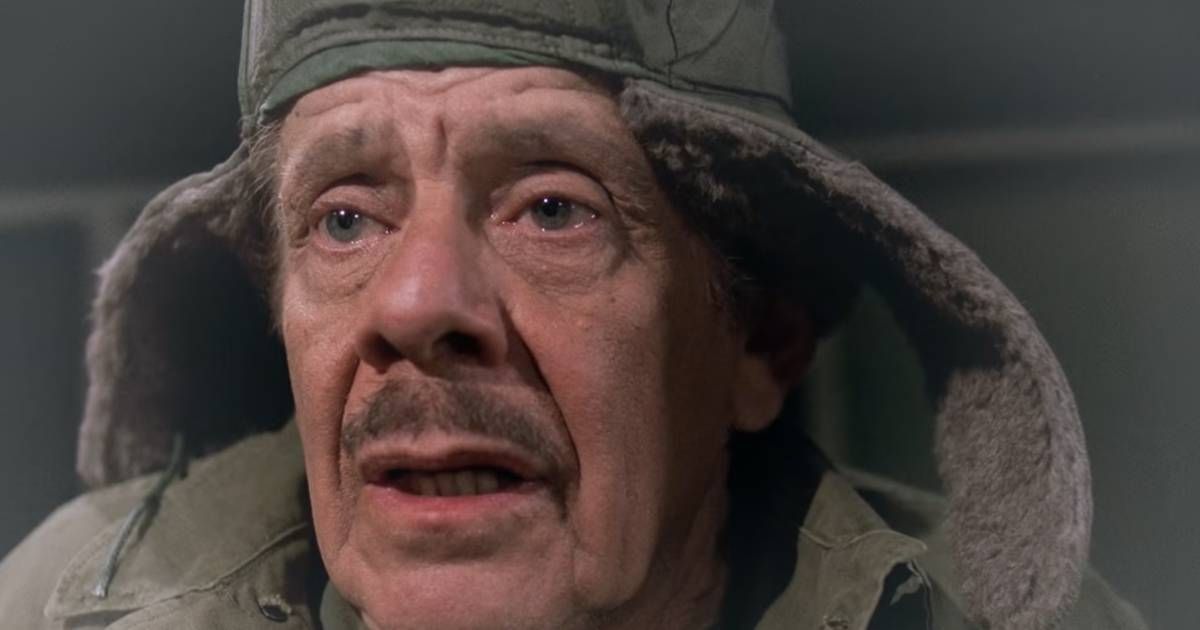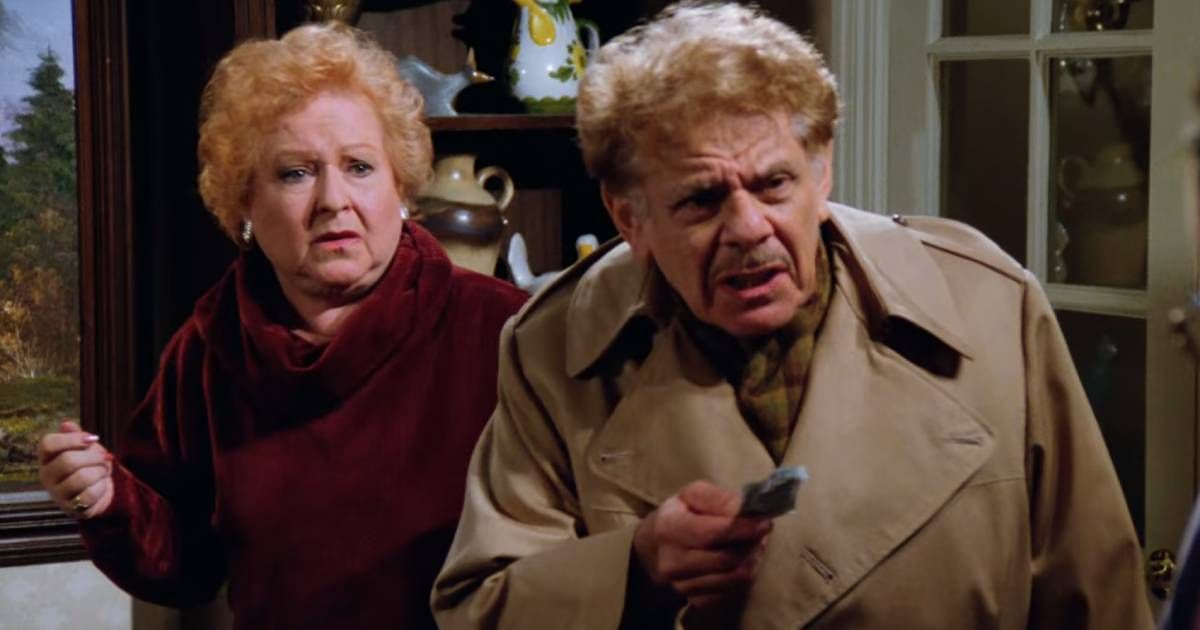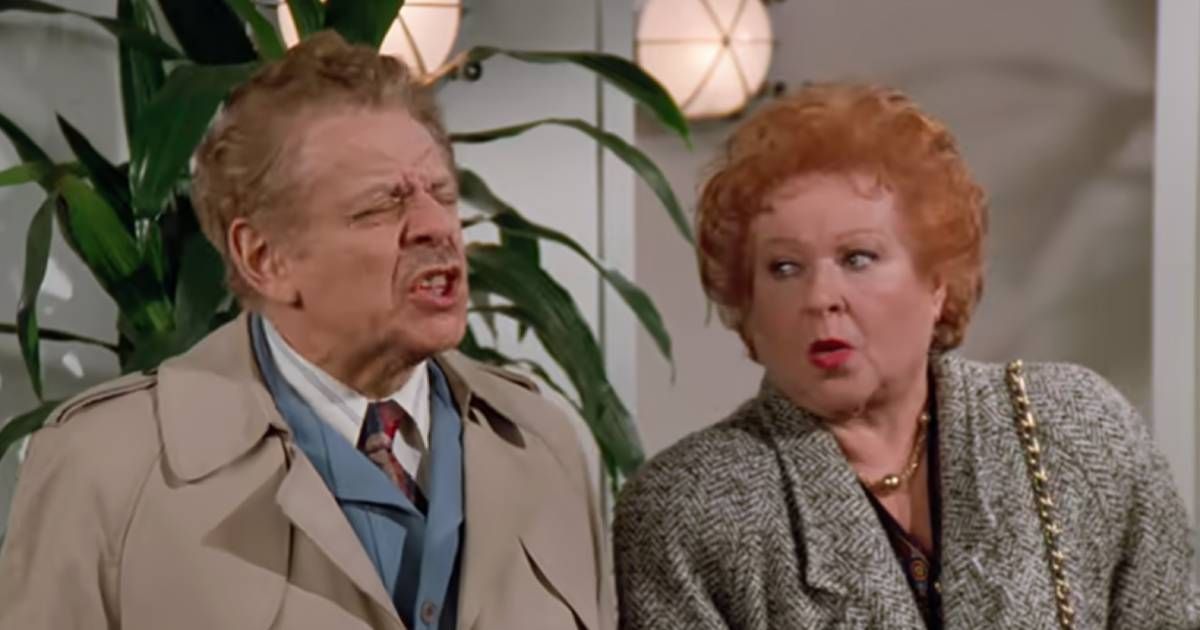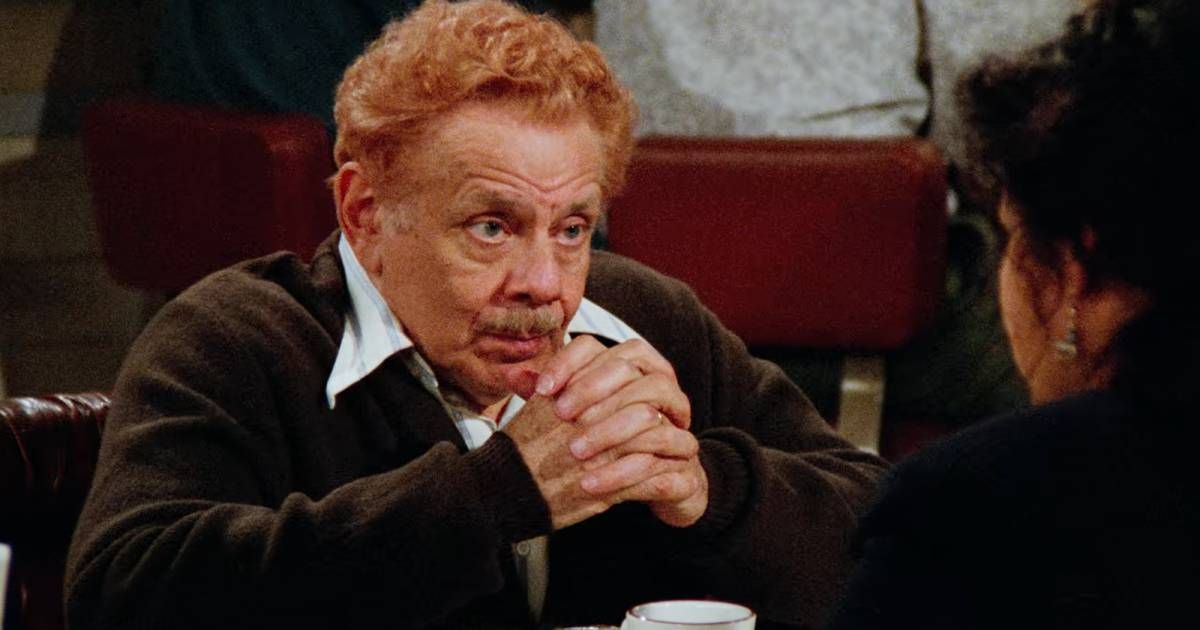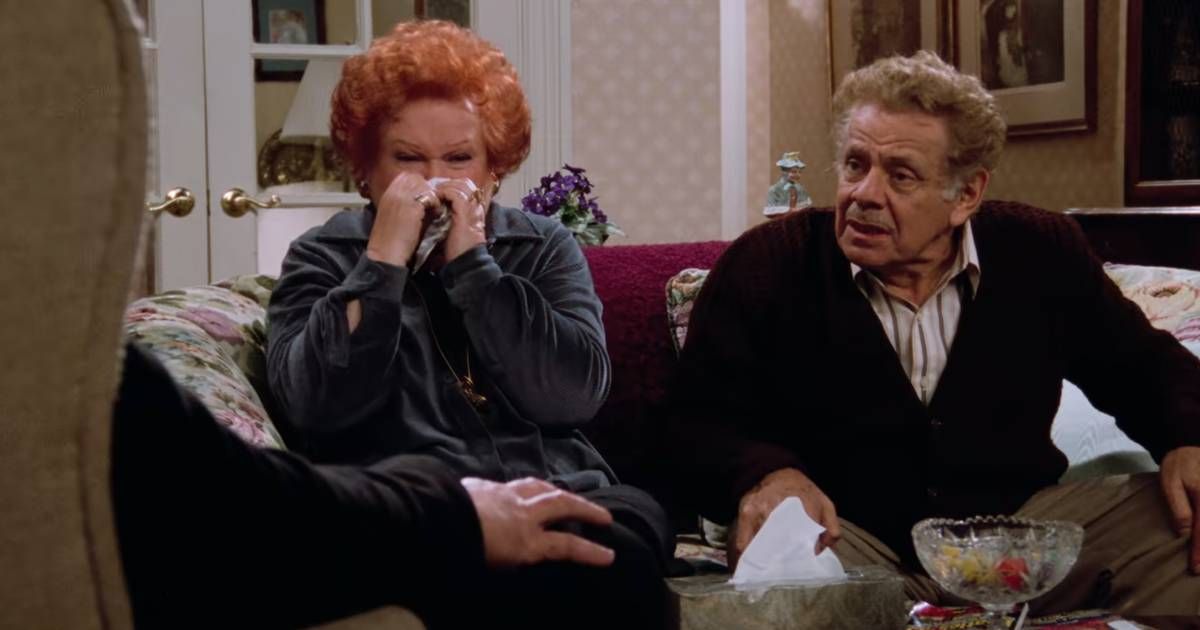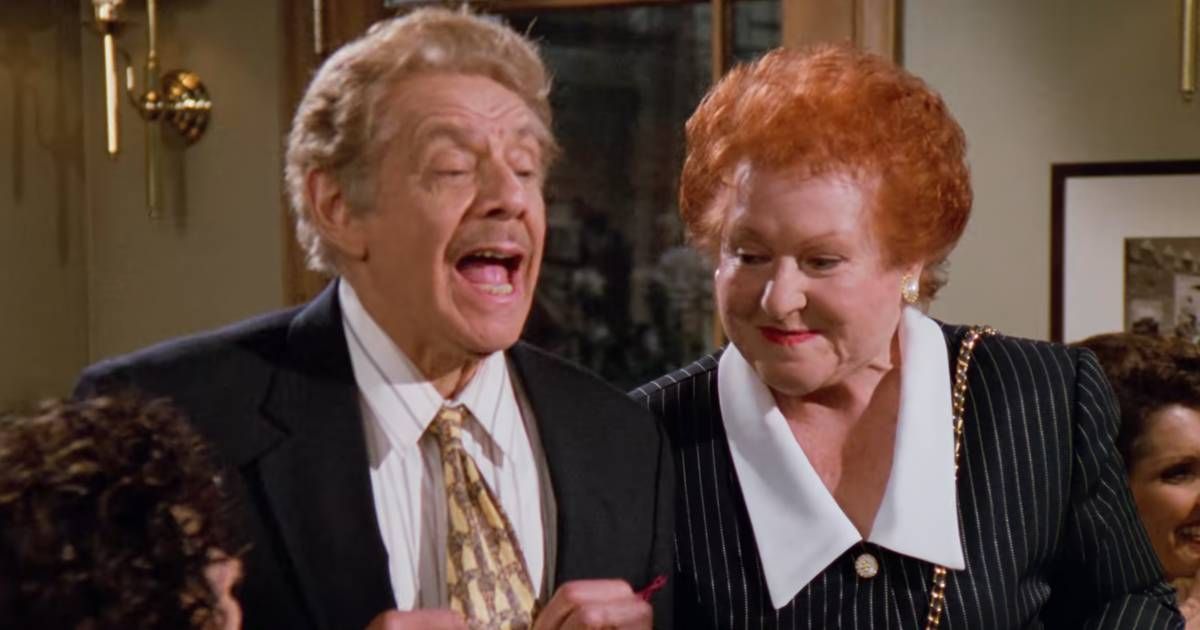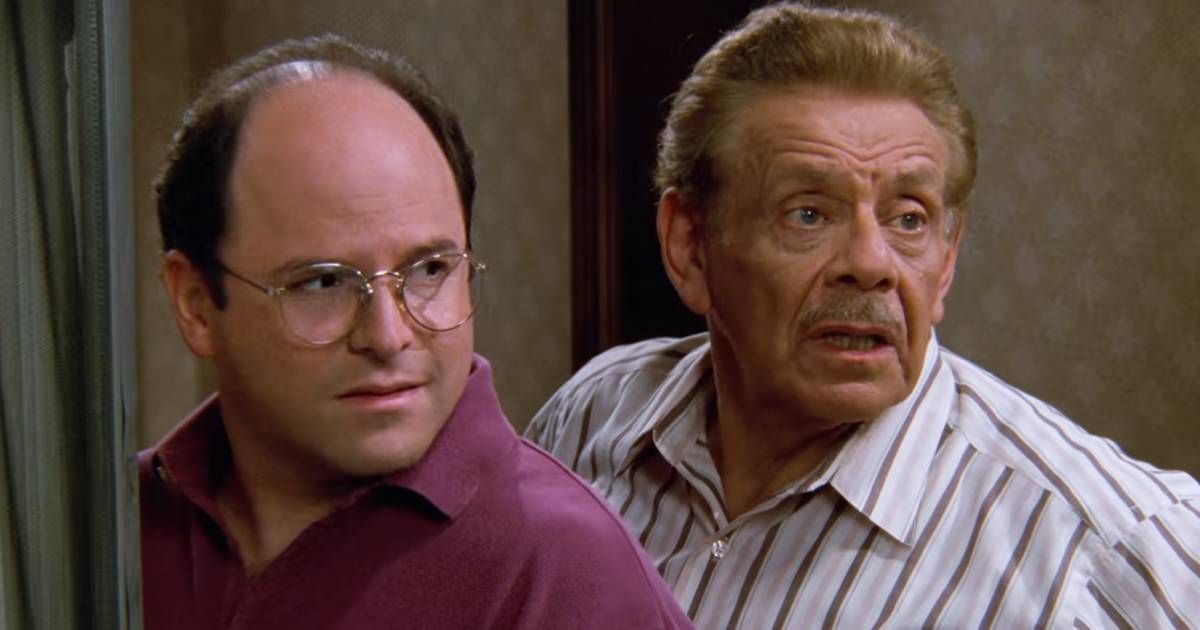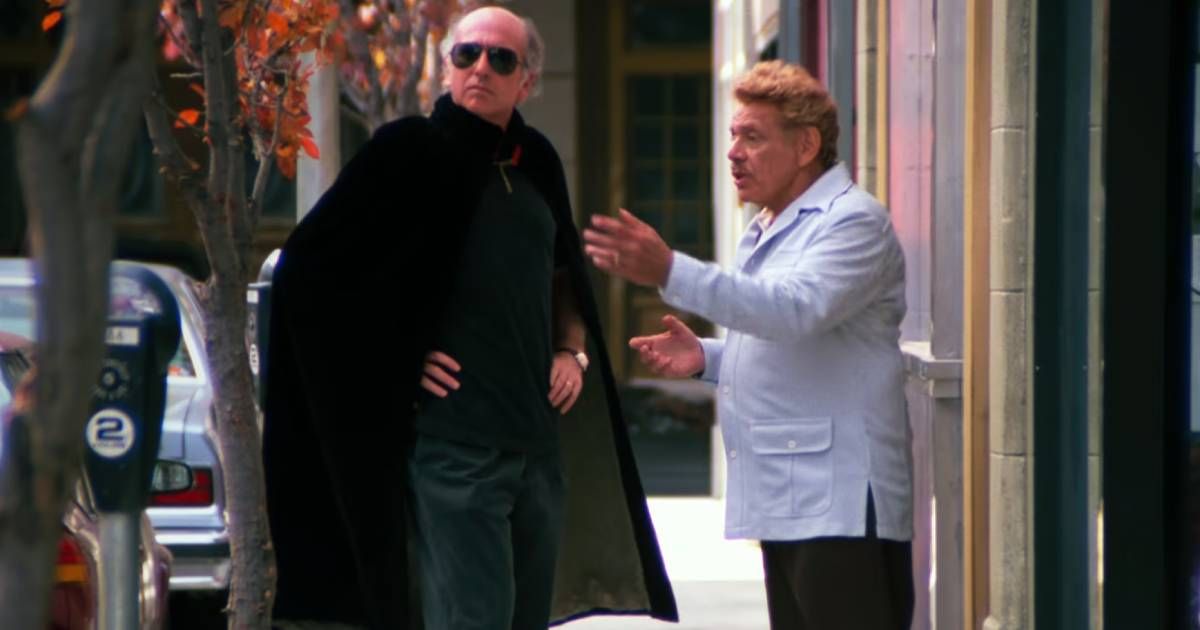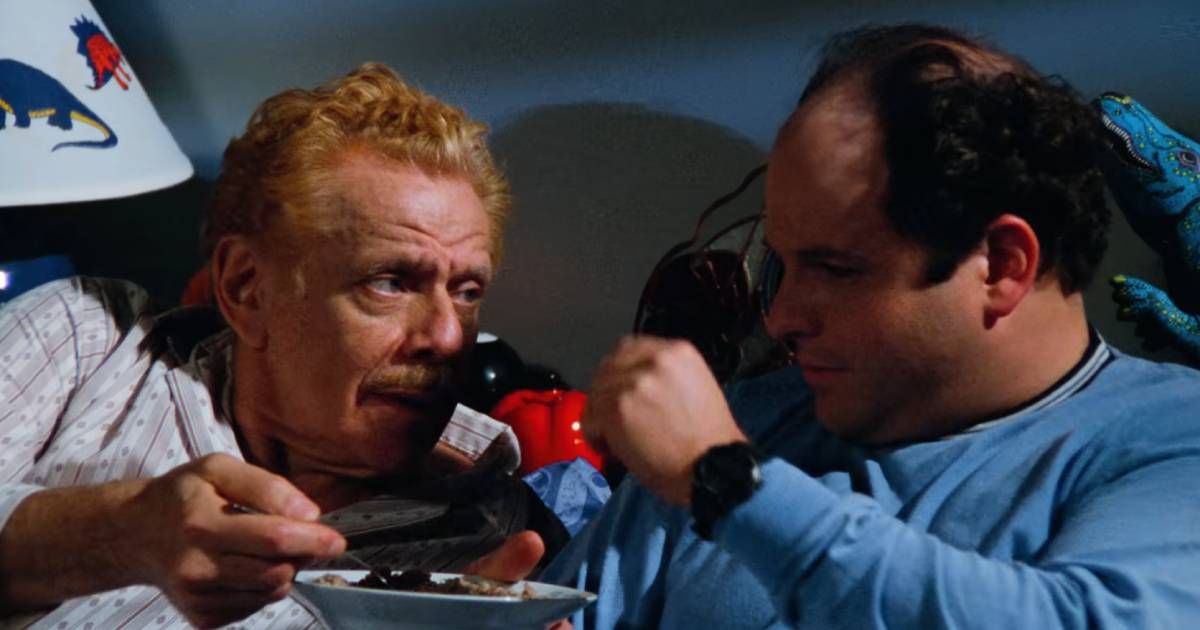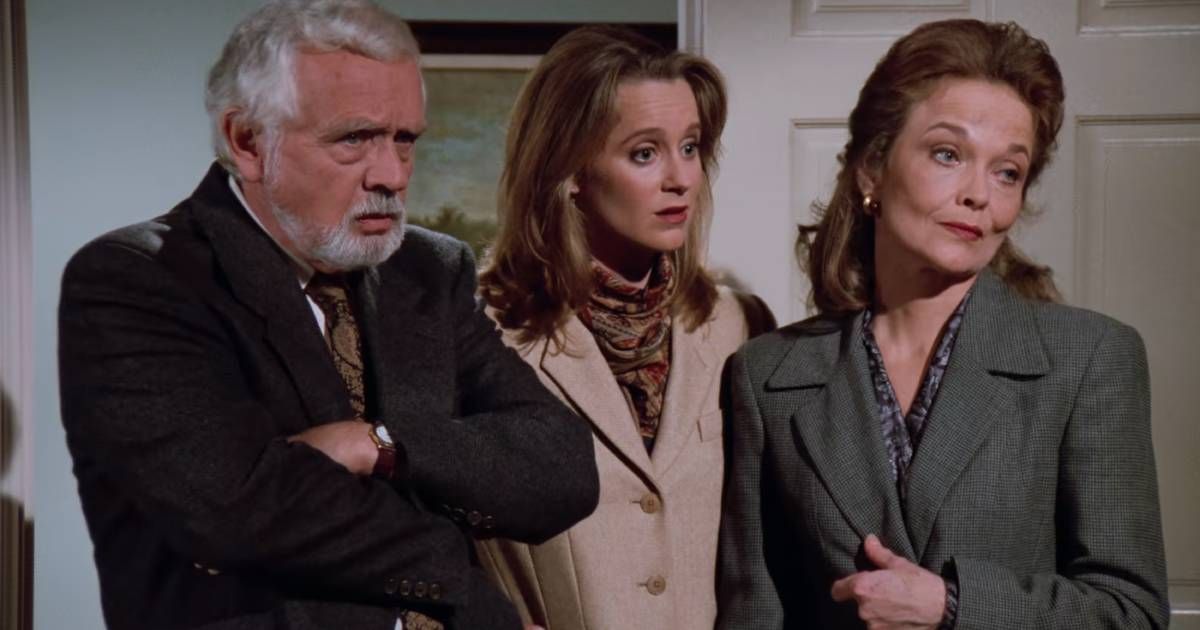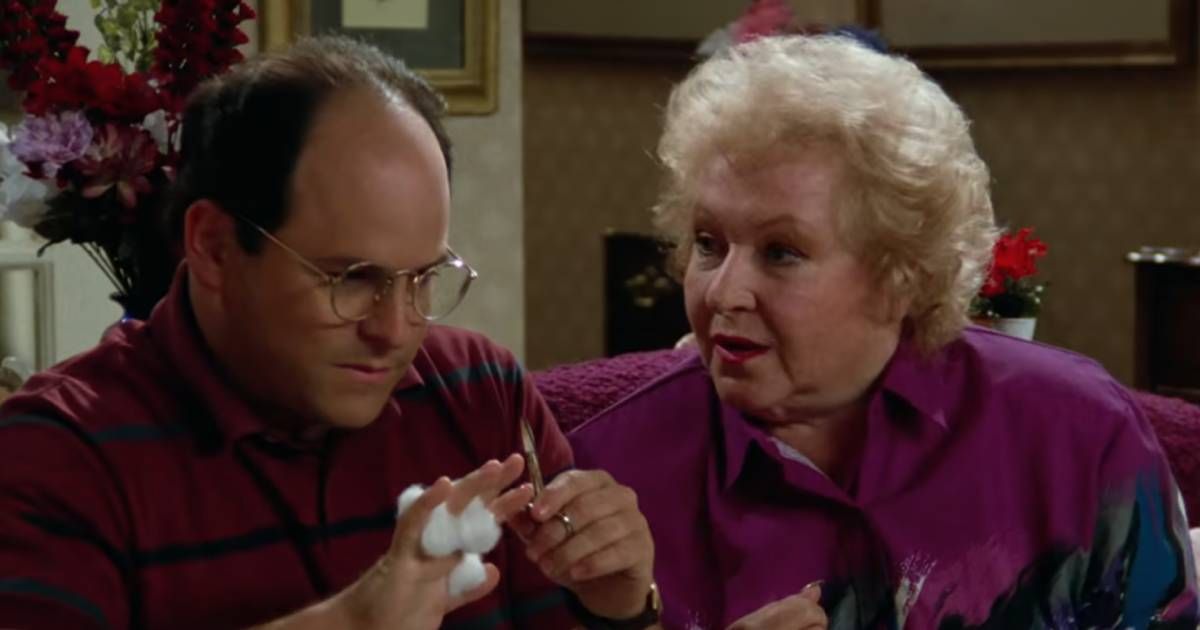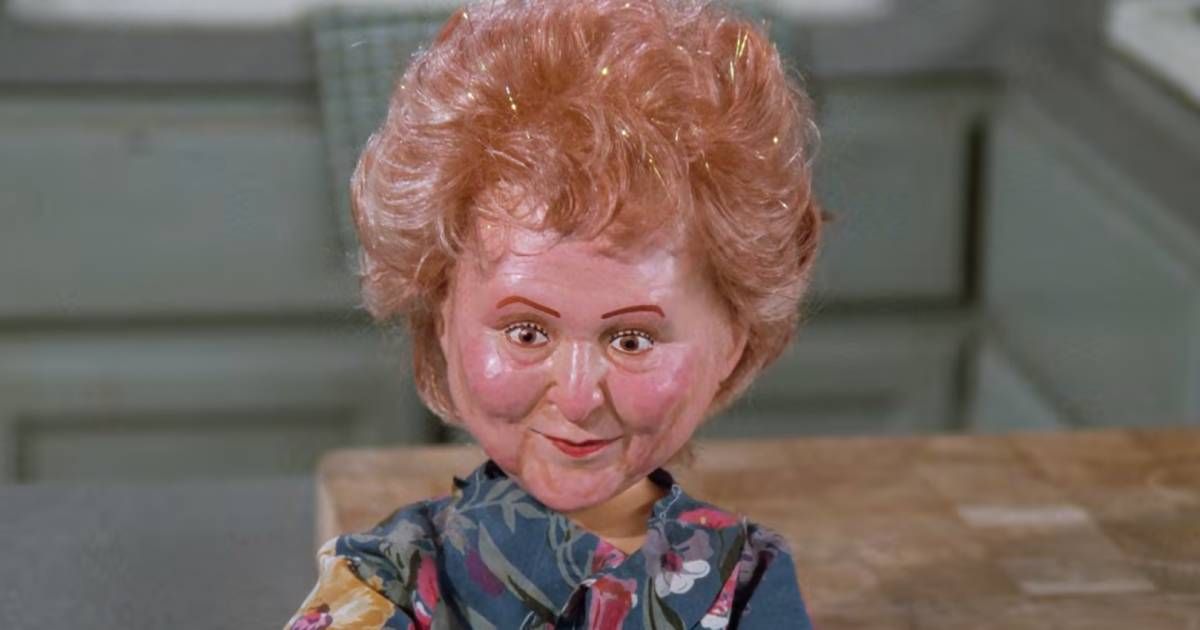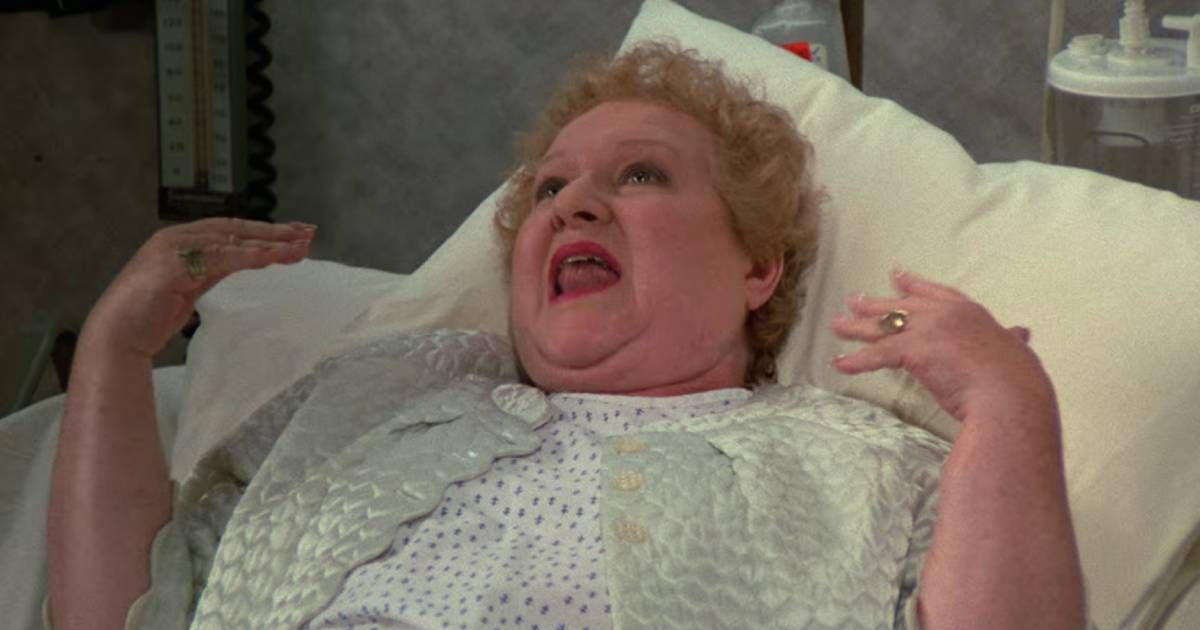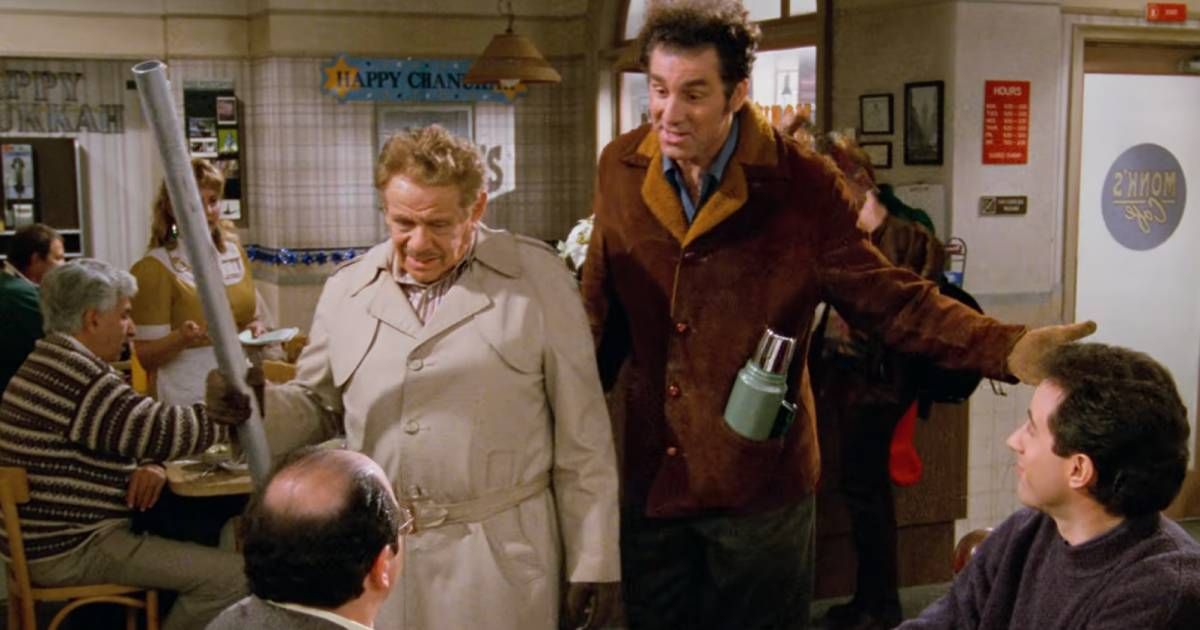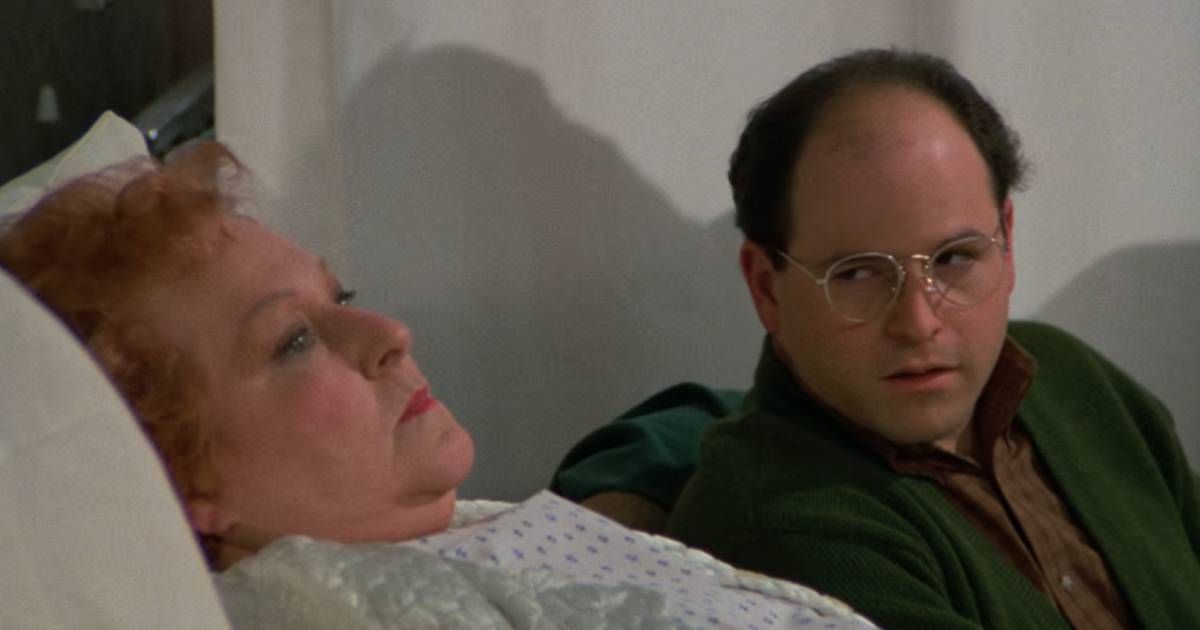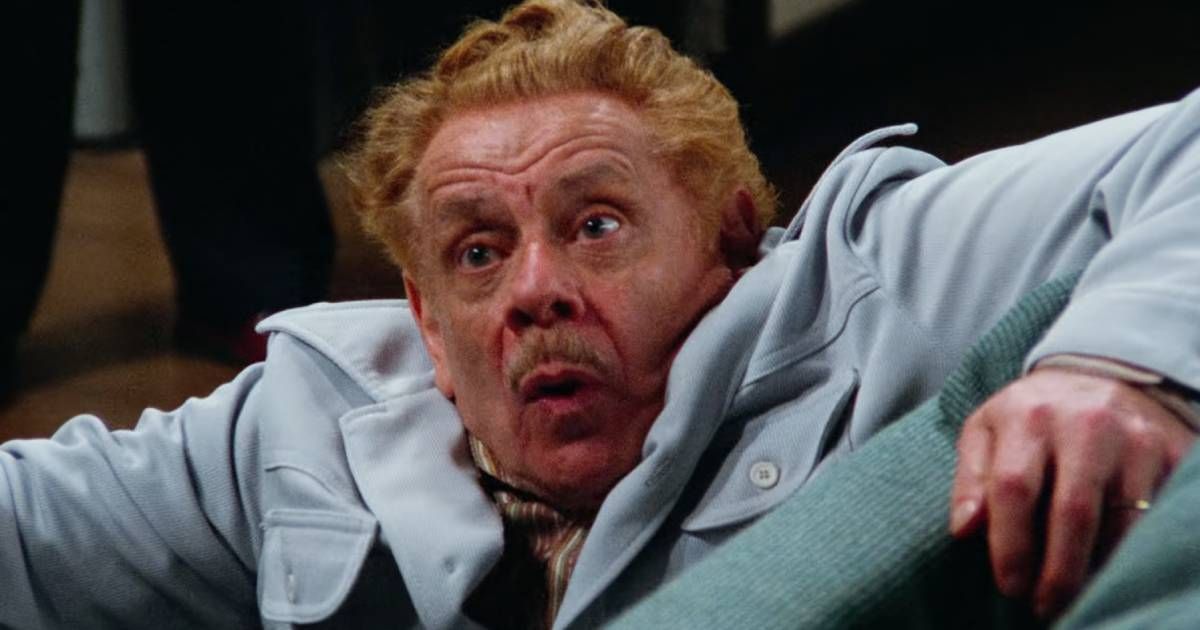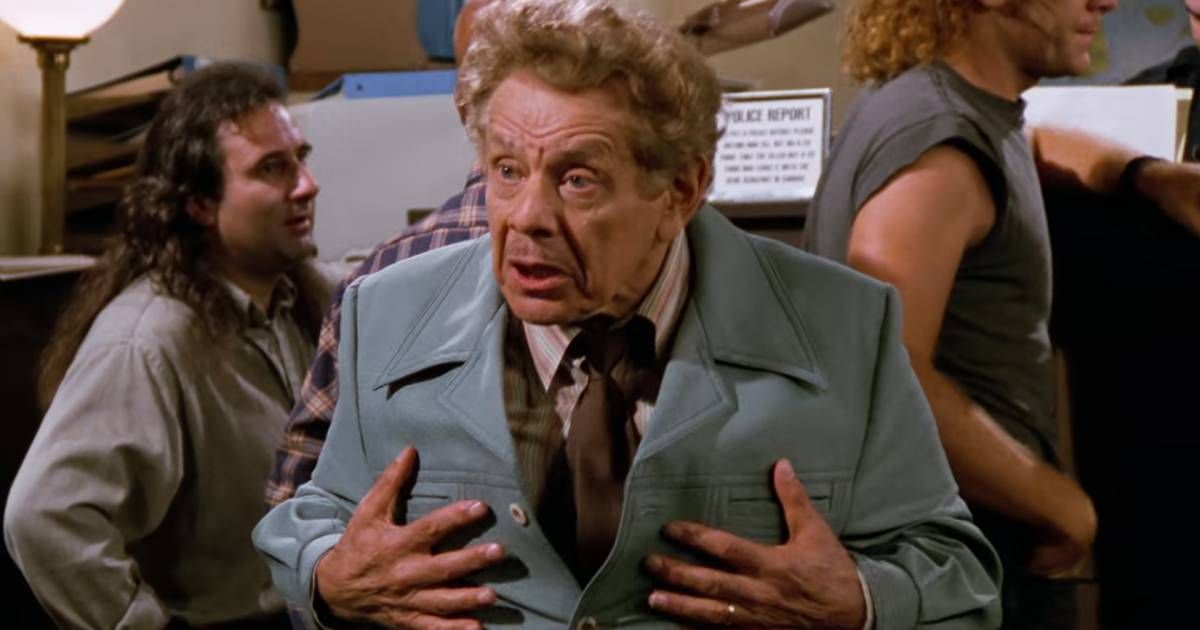No matter what, there's no escaping our past. The outlines of our childhood become the guardrails of our present selves; and oftentimes the trauma has a nasty habit of embossing itself most prominently, a tactile relief differentiating fear from hope, lethargy from action, and brackish cynicism from earnest conviction. Sometimes unfairly so, our parents and upbringing program our functioning in the real world.
Which helps explain why George Costanza from Seinfeld is the way that he is. Seinfeld is one of those shows that helped shape the sense of humor of millions, and Jerry Stiller and Estelle Harris' brilliant portrayals of Frank and Estelle Costanza are a huge part of that legacy. Here are the 18 funniest Seinfeld episodes featuring George's parents.
18 "The Cigar Store Indian"
Of all the fantastical things that happen on Seinfeld, the plot line for "The Cigar Store Indian" is pretty relatable. George meets a woman, and takes her home. The only problem is that it's still his boyhood home, and a twin bed is pretty tough to hook up on. Naturally, his parents being out of town, George pretends the house is his, serves her a glass of prune juice, and takes her to the master bedroom. All goes to plan — until George's mother comes home and finds a condom wrapper between the sheets.
George is busted. He confesses, seeing no way out, and spends the rest of the episode trying to convince his mother that she doesn't need to buy a new bed. But for a simple twist of fate, many of us could find ourselves in an equally awkward position. At least he's using protection.
17 "The Shower Head"
After years of having his parents only a borough away, it finally occurs to George how strange it is that they never retired to Florida to join their many peers.
The Costanzas are satisfied where they are, but change their minds once the Seinfelds try to keep them out. The move is vintage Larry David — once the slightest morsel of disrespect is detected, the host must feast upon revenge. The petty animus at play, especially among the older generation in the show, who have nothing better to do than claw each others' eyes out, is on full display. There's nothing quite as endearingly satisfying as conflict between old people.
16 "The Understudy"
This episode presents a rare alliance between Elaine and Frank, who usually only ever tolerate one another. They both have despotic, commanding tendencies, so it's easy to see why there's friction.
Still, they bag it up long enough for Frank to join Elaine at a Korean manicurist, translating what Elaine is sure are insults. Of course, she's right, but Frank blows the subterfuge with his bombastic temper, and Elaine is shunned from her regular shop. Frank ends up reacquainting with a long-lost love, but it doesn't work out when his cheap American Graffiti-style sexual harassment gets him shunned, too.
15 "The Caddy"
Once again, it's so much fun to see Frank and Estelle interact with members of the cast other than just George. It's almost as if they're kept pets in the Costanza family zoo, but whenever George isn't around, he forgets to shut the door to the monkey cage.
"Jerry, it's Frank Costanza. Mr. Steinbrenner is here, George is dead, call me back."
-Message on Jerry's answering machine
In this instance, George's absence at work and banged-up car lead Steinbrenner to conclude that he's died in service to the Yankees. Swell guy that he is, he visits the Costanzas personally to deliver the news, but all Frank wants is to excoriate Steinbrenner for his Buhner/Phelps trade with the Mariners. Frank is a Yankee, first and foremost.
14 "The Money"
While sniffing around about his inheritance, George accidentally triggers Frank and Estelle's awareness of their sizable nest egg, and their limited time to spend it. From then on, it's Pierre Cardin ties and Coupe d'Elegance Cadillacs.
What's interesting is a piece of sage business advice from George, who advises Elaine to schedule a late meeting to get Morty Seinfeld fired. According to George, "These guys are up at 4am. By 2:30, they're wiped." It's actually a brilliant strategic move. Even more, his parents end up finally moving to Del Boca Vista. Of all the episodes on this list, George actually comes out relatively on top by the end.
Until Frank sees Jerry asleep in a Cadillac, and mistakes him for a bum. Then it's back to Queens again.
13 "The Serenity Now"
Childhood friend and erstwhile competition for George is Lloyd Braun, who had a nervous breakdown after getting dumped by Elaine and losing the mayoral race for David Dinkins.
From then on, George relishes in taking stabs at Lloyd's tenderest targets, as payback for all the times Estelle compared him unfavorably to his more successful friend. So George can't take it when Lloyd outsells him in Frank's cockamamie computers-over-the-telephone sales model. Meanwhile, Frank has gotten into the habit of yelling "serenity now!" every time he's frustrated, which is kind of a lot.
Lloyd, resigned to defeat, warns George on his way out the door that Frank shouldn't rely too much on his technique, in that it bottles up the anger. Ever the gentle touch, George sneers incredulously at Lloyd's grasp of mental health, over his "stay in the nuthouse." Lloyd's wide-eyed response has become a Seinfeld classic: "Serenity now. Insanity later."
12 "The Chinese Woman"
This entry was really just an excuse to prominently display Larry David as Frank Costanza's divorce attorneys, the Man in the Cape. "It's good cape weather," Jerry quips.
Also, Estelle doesn't trust the advice of Jewish girls from Long Island. Is Changstein even a real last name? Seems like a reach.
11 "The Doorman"
Frank, while separated from Estelle, ends up living with George for a short while. His idea of bachelorhood, including record shopping in Greenwich Village, is actually quite charming, in an Inside Llewyn Davis kind of way. But records lead to cha-chaing, and cha chaing leads to dancing with Kramer, and dancing with Kramer leads to the invention of the first chest support undergarment for men, the bro/manssiere.
Unfortunately, Frank's contact in the bra world, Sid Vargas, puts his foot in his mouth by suggesting a liaison with the newly-single Estelle, sexual minx that she is. Frank explodes, the business is kaput, and George is stuck in a bed with Frank turning down a bite of kasha.
10 "The Rye"
Somewhere around George and Susan's second outing and subsequent engagement, the Rosses, Susan's parents (having patched things up after the discovery of Henry Ross' longtime affair and correspondence with author John Cheever), decided to give it the old WASP treatment: They buried their mistakes, sentiments, and proclivities in maid services and clear alcohol. You know, for the sake of the estate. You never want to argue in front of the money.
The result being their sounding board as a relatively normal family unit, as opposed to the Costanzas, who have the relative stability of a suspension bridge made of custard. This juxataposition is on full display during The Rye, when Frank decides to impress his future in-laws with a prized loaf of rye bread from Schnitzer's Deli. When they forget to serve it, Frank revernts to his default position of justified umbrage, and steals the loaf back. This leaves George holding a fishing pole to retrieve a substitute rye from Jerry at street level after a flatulent horse fails to adequately distract Susan's parents.
In a perverse way, it's endearing that George would go through such lengths to ensure a positive relationship between the two sets of elderly couples. Vitriol among family members can put a lot of stress on a marriage. Luckily, you know. Susan dies, so it never comes up again.
9 "The Junk Mail"
It's pretty simple, really. George catches his parents avoiding him, and decides that being caught romancing his cousin is the best way to win back their attentions.
It's a late-series, post-Larry David move, to be sure. Incest, while a popular literary theme among the sexually transgressive works of Nobokov or the Marquis de Sade, is generally thin in primetime sitcoms. What it represents in the history of the show is a reversal of the standard paternal attitude usually displayed by Frank, and especially Estelle. She's usually so worried about George, and wants constant updates on his career, love life, friends. She really is a concerned mother.
Frank: "George, we've had it with you. Understand? We love you like a son, but even parents have limits."
Estelle: "The breakups, the firings. And every Sunday with the calls."
Frank: "We're cutting you loose. [...] Now if you'll excuse me, I'm gonna make love to your mother."
So it's all the more telling that their tolerance for George's constant shenanigans finally hits a wall, and they can't even feign interest for a weekly phone call. In terms of structure, it had to happen. In terms of content, it's pretty messed up.
8 "The Puffy Shirt"
At the beginning of the fifth season, George finds himself unemployed, broke, and forced to move back in with his parents. At his lowest, he prays for fate to bestow upon him just one talent that makes him special and unlike anyone else. It's a vain prayer, but it works: he bumps into a woman with a connection to the modeling industry, and it's discovered what picturesque hands George naturally possesses.
"You don't have to worry about me. I won a contest." -George Costanza, referencing the Mastery of his Domain
George's matter-of-fact confidence could easily mean a long, successful career as a hand model, until the low-talker pushes him onto a hot iron. Frank and Estelle are largely window dressing in this episode, but it's a slice of life being around them, surrounded by the existential dread of two geriatrics yelling over each other about cut up bananas in a batch of Jell-O.
7 "The Doll"
The most frustrating part of this episode is that Susan, who has met George's mother several times, refuses to acknowledge the resemblance.
From a psychological standpoint, it would make sense that, since she's had her dolls since she was a little girl, she would associate this doll with some cherished childhood memory, rather than a latter-day passing resemblance. It's the same reason that in Back to the Future, George and Lorraine never put together that their son Marty looks an awful lot like that skateboarding miscreant from high school, Calvin Klein.
Still, here's hope some member of the props staff on Seinfeld got a raise for their contribution, because that doll is unmistakably Estelle. Once we concede that point, then it's only natural that Frank Costanza will one day be in his son's apartment, see the doll, and rip her head off.
6 "The Contest"
Interestingly enough, it wasn't until the fourth season of Seinfeld that they expanded their cast roster to include George's parents. Estelle Harris' first appearance was in The Contest, as the cloying, disappointed mother who witnesses her son, "treating his body as if it were an amusement park." After she walks in on George pleasuring himself with a copy of Glamour magazine, she falls and throws out her back, leaving her character in the hospital for the duration of the episode.
The sexual innuendo reaches peak levels when George's visits coincide with a gorgeous hospital roommate receiving a sponge bath from an even more gorgeous nurse. The titillating action takes place in silhouette behind a curtain, allowing Seinfeld to maintain the treacherous tension between tasteful and trashy, in a curtains-blowing-in-the-wind-from-Casablanca kind of way.
What's more, George reveals the transparency of the id's dominance over his psyche when he tosses his mother some Tic Tacs to sate her hunger, rather than run out and buy her a sandwich and miss the sponge bath. George is a pretty wormy little guy, all things considered.
5 "The Strike"
The invention of, and continued participation in, the Frank Costanza-original Wintertime holiday Festivus is, in a lot of ways, the final puzzle piece in the reasons as to why George is the way George is. Coming in midway through the ninth and final season, we discover that, fed up with the consumerism of the holiday season, Frank makes Festivus about airing grievances to your family members, and performing feats of strength (usually forcing a weeping, pre-teen George to pin him while Estelle shouts at them both).
"Many Christmases ago, I went to buy a doll for my son. I reached for the last one they had, but so did another man. As I rained blows upon him, I realized there had to be another way!"
The caper comes to a climax when George, having been caught at work faking donations to a non-existent charity, claims religious persecution for his belief in Festivus. George, his boss Kruger, Frank and Estelle, Kramer, Jerry, Elaine, and the tellers at the offtrack horse betting saloon that Elaine uses as her standard blow-off phone number for unwanted romantic advances, all rejoice.
4 "The Outing"
Once again, Estelle has thrown out her back, and once again, she finds herself being visited by George in the hospital. Only this time, it's because the New York Post has mistakenly outed George and Jerry as homosexuals.
"It's Guys and Dolls. Not Guys and Guys." - George,
The juxtaposition of "The Outing" to "The Contest," only a few episodes before during the same season, is hilarious. Watching George's facial expressions when confronted with a gay version of the sponge bath, moving from confusion, to apprehension, to outright terror at having to confront the splintering chassis of his own fragile masculinity, is akin to watching a car wreck. Not that there's anything wrong with it.
3 "The Fusilli Jerry"
One of the strongest stratagems of Seinfeld's writing was how deftly the dialogue could dance around circumstances that may have been untoward. For example, having an episode in which the climax is a figurine made of raw pasta accidentally getting lodged in Frank's anal cavity.
"It was a million to one shot, doc. A million to one."
For the first time in the proctologist's career, this line happens to be the truth. The madness surrounding a faulty vanity license plate, Kramer's slapdash semolina sculpturing, Frank's automotive-based sexual harassment, and Jerry's concern over credit and copyright of particular sexual acts makes this episode one of the topsy-turvy classics of plot juggling, and it has a number of best of moments. Kramer nonchalantly using his "ASSMAN" license plate as an excuse for preferred parking at the hospital is a favorite. However, very little tops Jerry Stiller's facial expressions and noises as Fusilli Jerry's tiny comedian wedges itself into a new performance venue.
2 "The Little Kicks"
This episode only features Frank, George's father, and for only one scene, just at the end of the episode. It's also one of the best examples of Frank's most conflicted relationships with the gang. First, he's disappointed with his son, who has borrowed has gotten caught bootlegging films by the police.
Even better, his seemingly always untrustworthy relationship with Elaine finally hits the skids in a big way. Both Frank and Elaine are beyond frustrated, and neither is one to back down from a fight. What we see is when an unstoppable force meets an immovable object, where Frank accuses Elaine's coworker of orchestrating the whole fiasco. When Elaine interjects and insults George, Frank takes it personal and delivers an all-time character-best delivery of the line, "You want a piece of me?" One can practically see Jerry, the actor, baiting Julia, the actress, into trying not to laugh at him. She fails, miserably, giving us one of the greatest runs of outtakes in the show's history.
Ostensibly, the characters end the encounter by coming to blows, but it's clear from the outtakes that the performers are madly fond of each other, and are having a blast exploring the dynamics of their characters.
1 "The Fatigues"
Frank Costanza's wartime experience had, until season 8, largely been shrouded in mystery. In "The Fatigues," we finally find out why when he opens up about his harrowing past to Kramer, who's quite sweet in his support of Frank's emotional state.
Frank was a cook in the Korean War. After uncovering some prime beef past its expiration date, he assures his unit that it can be cooked properly to make it edible. After pouring on what looks like two cups each of curry powder and paprika, then giving it a good whack with a cleaver, dinner is served. His whole unit becomes violently ill, and he carries the scars of their nausea with him for forty years.
Meanwhile, in the present, fed up with Estelle's lackluster cooking, Frank resolves to return to the kitchen, agreeing to help Kramer cater a Jewish singles night. Unfortunately, Elaine has promoted a mailroom worker who is obsessed with killer imagery and dresses in military fatigues. After an innocuous cough, Frank's sense memory kicks in, and he's convinced his cooking is toxic. The episode ends with him tipping over the food table, ruining the singles event. It also nabbed Jerry Stiller his only Emmy Nomination for the role, and goes down in history as the funniest bits of introspection into Frank's addled, troubled mind.

